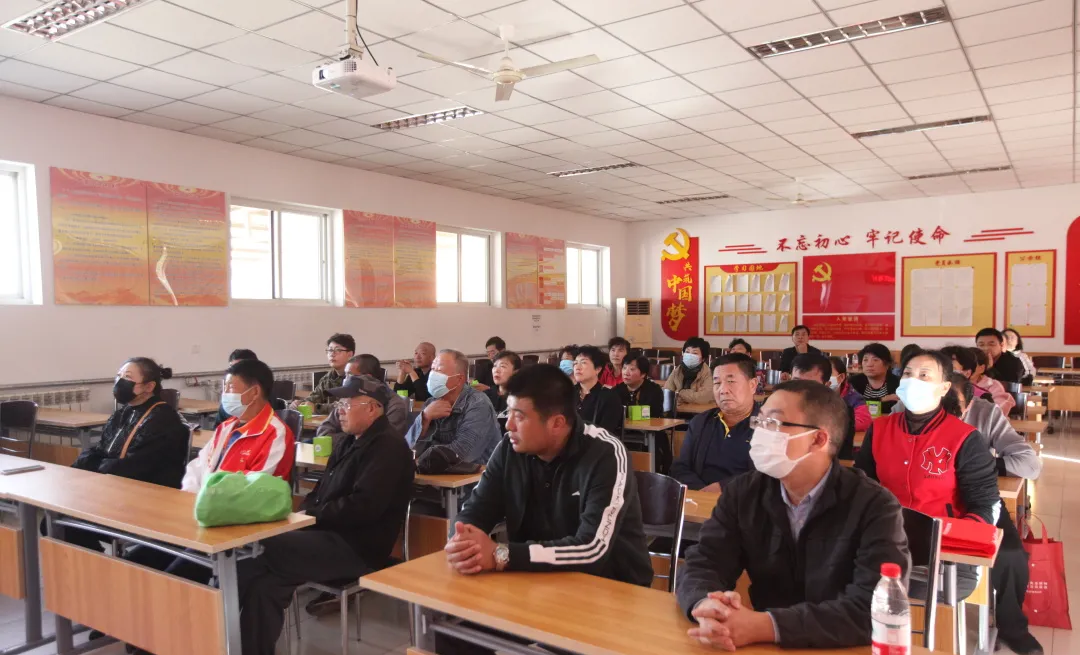
Recently, the Haidian Court's law popularization delegation went to the Baijiayan Village Committee of Wenquan Town, Haidian District, to carry out the "100 Lectures on the Civil Code" law popularization activity. Yan Su, president of the Shanhou People's Court of the Haidian Court, Yu Ying, deputy director of the Wenquan Town Judicial Office, Wang Bo, secretary of the general branch of the party in Baijiayan Village, and more than 30 residents of Wenquan Town attended the propaganda activities.
Li Xin, assistant judge of the Shanhou People's Court, integrated the civil litigation, rural house sales, and making of wills that villagers are concerned about into the story of the popularization of the law, "Those Things of Zhang Dashan's Family", so as to explain the relevant provisions of the Civil Code in a way that is easy for the people to understand.
Wang Shengmiao, a police officer of the Propaganda Group organized by the Political Department of the Haidian Court (party committee of the organ and the discipline inspection committee of the organ), explained the function and operation method of the litigation source governance demand response platform, and demonstrated to the villagers participating in the activity how to put forward the litigation source governance demand through the WeChat Mini Program.
After the lecture, the Haidian Court Law Popularization Propaganda Group presented the Civil Code of the People's Republic of China to Wenquan Town, Haidian District, hoping to enhance the people's awareness of studying, abiding by, and using the law through the "Civil Code Around the People" law popularization activities.
Civil Code Popularization Classroom Around the People
Case 1:
In 2005, Zhang Dashan and the village committee signed a "lease contract", rented an idle vacant land from the village committee, agreed on a lease period of 50 years, and then Zhang Dashan built a house on the vacant land to run a car wash shop. In 2015, the village carried out an environmental order cleaning and rectification operation, and the doors and plaques of its car wash shop were removed, which seriously affected the operation of the car wash shop. Zhang Dashan filed a complaint against the village committee in court, demanding that the village committee compensate for its related losses.
Is Zhang Dashan suing right? Which disputes fall within the scope of civil litigation?
The losses claimed by Zhang Dashan are caused by administrative acts such as environmental remediation carried out by relevant departments, and disputes caused by administrative acts fall within the scope of administrative litigation. Article 2 of the Civil Code stipulates that the Civil Code regulates the personal and property relations between natural persons, legal persons and unincorporated organizations with equal subjects. Therefore, Zhang Dashan's lawsuit against the villagers' committee for administrative acts does not fall within the scope of civil litigation.
Case 2:
Zhang Dashan's car wash shop could not be operated for a long time, so he had to find another way out. In January 2016, Zhang Dashan signed a "House Sale and Purchase Agreement" with Wang Xiaoshan in the next village, selling his own house to Wang Xiaoshan.
Is the Agreement for the Sale and Purchase of Houses signed between Zhang Dashan and Wang Xiaoshan in relation to his own residence valid?
The agreement for the sale and purchase of houses signed by Zhang Dashan and Wang Xiaoshan only involves houses on the surface, but in fact it also involves the right to use the homestead. Homestead land has the identity attribute and is a right enjoyed by members of collective economic organizations, and China's laws and regulations clearly prohibit the purchase and sale of the right to use homestead land. Therefore, the rural housing sale and purchase agreement, which usually violates the mandatory provisions prohibiting the transaction of homestead land, is an invalid contract.
Case 3:
Old Man Zhang is old, he wants to make a will of his own, I heard that I can go to the notary office to make a will, he made a notarized will, and then went home to think carefully, Old Man Zhang changed his mind again, and wrote a will at home.
When there are multiple wills, which one should be used?
Prior to the implementation of the Civil Code, Article 20 of the Inheritance Law stipulates that notarized wills may not be revoked or modified by self-written, written by proxy, recorded or oral wills. However, after the implementation of the Civil Code, the priority of notarized wills has been changed, and the third paragraph of Article 1142 of the Civil Code stipulates that there are several wills, and if the contents conflict, the final will shall prevail. That is to say, Old Man Zhang first made a notarized will, and then made a self-written will, and in the case of both being valid, the self-written will at the time should prevail, and the true intention of the testator should be more respected.
Contributed by: Haidian Court
Photograph: Zhou Yuhang
Editor: Jiang Xinyu Yao Rihui